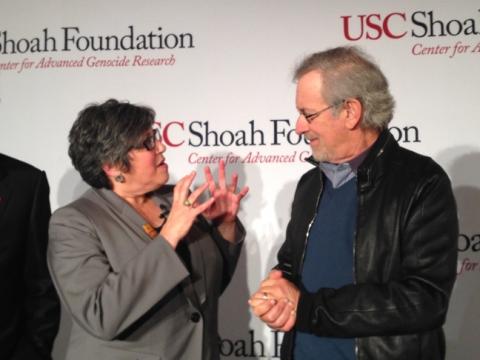New USC center to analyze advanced genocide research
The Center for Advanced Genocide Research will focus on interdisciplinary study organized around three themes to advance the analysis of genocide and systematic mass violence on an international scale.
“Resistance to Genocide and Mass Violence” will center on acts of resistance and elements of defiance that slow down or stop genocidal processes. “Violence, Emotion and Behavioral Change” will study the nature of genocide and mass violence and how they impact emotional, social, psychological, historical and physical behavior.
“Digital Genocide Studies” will examine how big data and large data sets, including the 52,000 testimonies in the USC Shoah Foundation’s Visual History Archive, can be used to find patterns in the field of mass violence and its resistance. “By combining ongoing research with the vast amounts of information already collected by the USC Shoah Foundation, I believe we will be able to decode the conditions that can lead to genocide,” said Steve A. Kay, dean of USC Dornsife. “And by funneling what we learn through our Digital Humanities program, we will be able to teach tomorrow’s leaders new ways of stemming the tide of violence and intolerance.”
The center will position USC as the only world-renowned private research institution with substantial original material from the Holocaust and other genocides. The USC Shoah Foundation’s Visual History Archive contains nearly 52,000 testimonies with survivors and witnesses of the Holocaust and other genocides, including the Rwandan Genocide and the Nanjing Massacre. Testimonies from survivors of the Armenian and Cambodian genocides will be integrated in 2015.
The Special Collections of USC Doheny Library houses private papers of German and Austrian emigrants who fled the Nazis, among them the famous German-Jewish writer Lion Feuchtwanger. The Holocaust and Genocide Studies collection at Doheny Library contains more than 1,000 original Nazi books and pamphlets and Jewish publications, as well as microfilms with original documents, including Nazi newspapers. This collection also contains books on almost every facet of the Holocaust and on various genocides, with a total collection of relevant works reaching 12,000 volumes.
“We need to better understand the causes and consequences of violent and genocidal societies,” Smith said. “By building on the robust genocide research opportunities already in place at USC, we will be in a position to have a real impact in the field.”
Added Gruner: “With its fellowship program, future conferences and chairs, the new research center will create an intellectual hub for international and interdisciplinary scholarship on the topic of Holocaust and genocide studies. Los Angeles is home to the largest survivor communities of several genocides, including the Cambodian and Armenian genocides. They will act as a constant reminder of the importance of our task.”
Robin Migdol

